Interview - Next door : Let’s talk with Daniel Brühl
By Mulder, Paris, Le Westin Paris, 25 january to 25 november 0021
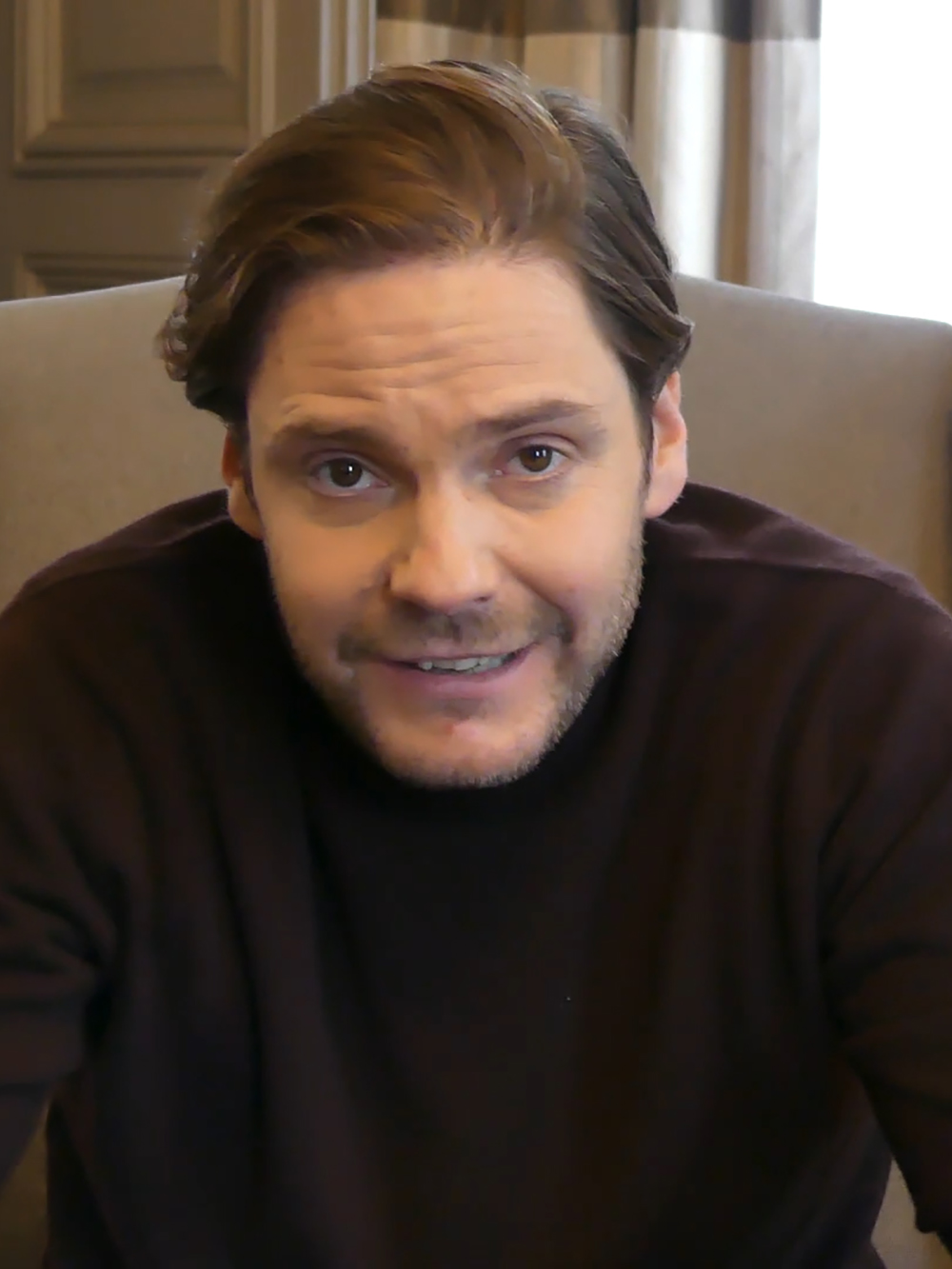
Next door (Nebenan) is on a movie star (portrayed by Brühl) who is confronted with revelations by a neighbor (Peter Kurth). The film premiered at the 71st Berlin International Film Festival. For Daniel Brühl, Nebenan is his debut as a film director, he also took the lead role. The screenplay was written by Daniel Kehlmann, based on an idea by Brühl. Filming took place in Berlin and had to be interrupted on March 28, 2020, due to the COVID-19 pandemic. They resumed from May 11, under strict protective measures, and ended on June 18, 2020. The film was produced by Amusement Park, which Brühl co-founded with Malte Grunert and Klaus Dohle in Berlin, and the German offshoot of Warner Bros. Grunert described Nebenan as a "dark comedy that deals with social inequality and gentrification" in late September 2019. Annegret Weitkämper Krug (Gretchenfilm) served as co-producer, while the project received financial support from Medienboard Berlin-Brandenburg, the German Federal Film Board (FFA), and the German Federal Film Fund.
We had the opportunity to interview during a long interview Daniel Brühl about his first movie as a director, his work with Marvel Studios and about the movie industry.
Q : In a few words, can you talk to about the story of this film ?
Daniel Brühl : it's a duel almost like a western set in a Berlin bar between two men, strangers, it seems, but then we realize they're neighbors who live in the same house but come from two different worlds so one is a very narcissistic and successful or he thinks he's very successful actor who's very full of himself and who's not aware really not interested in his environment, not even interested in his family really and then you have a neighbor from the former East a local guy who's probably always been living in the same neighborhood and who is struggling to find his place in this in this modern world so it's the clash between those two. I always saw it a bit like western without weapons the words are the weapons watch before you a good acting direction.
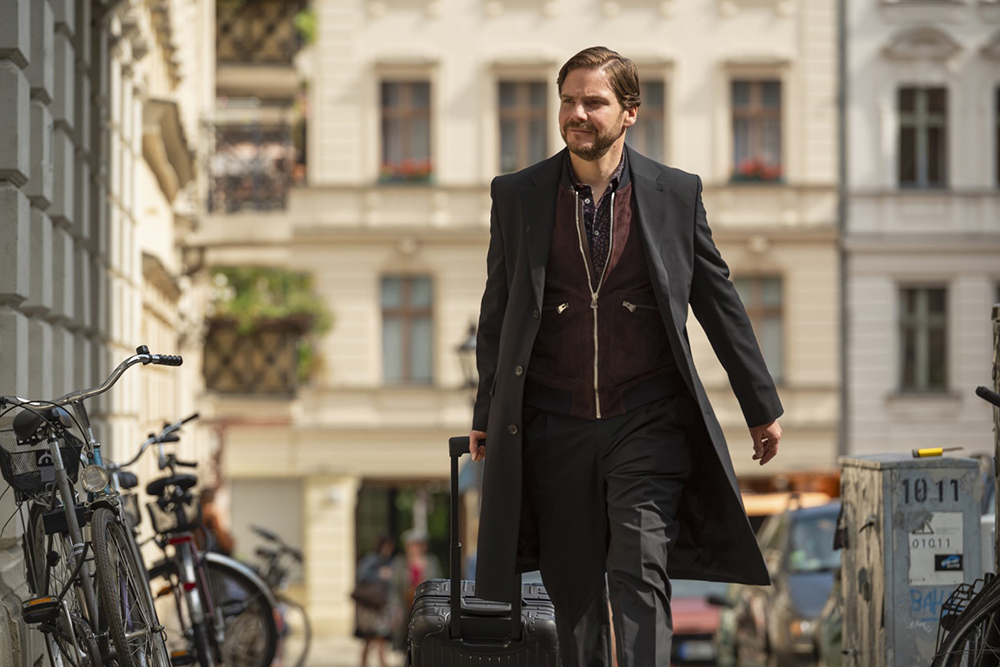
Q : What should be for you a good acting direction? What can you tell us about you work as a director and an actor with Peter Kurth ?
Daniel Brühl : i mean for me it was an absolute dream to be able to direct something. I'd had this desire for a long time you know and as a film actor not to be excluded from any of the parts of filmmaking to be involved in the in the writing working on it with the scriptwriter Daniel Kehlmann to execute it the way you want to do it the editing etc. So, that was a marvelous experience and I wanted to direct something in a very contained world i wanted to do a “Huis-clos” so it was very much about the dialogue and about the actors and it's especially. it's about these two men so i needed, you know for my first film the best actor i could think of for to play that part of the Bruno and I thought about Peter Kurth from the beginning this was my first choice and i never actually had a plan B. i asked the scriptwriter who would you uh consider he said Peter Kurth so we both had the same idea and had him in mind when we were, you know, working on the on the script so he accepted to do it sent me a letter after 24 hours and that was a huge relief.
Q : You have worked with many famous directors such as Anthony and Joe Russo, Christian Carion, José Padilha, Julie Delpy, Michael Winterbottom, Paul Greengrass, Quentin Tarantino, Ron Howard and Wolfgang Becker. You are also the screen incarnation of the character Baron Helmut Zemo in the film Captain America: Civil War and the series Falcon and the Winter soldier. Next Door is your first film as a director. what these films bring you to make this one ?
Daniel Brühl : all these very different and diverse experiences had an influence on this film. i was inspired by most of the projects i did and it also encouraged me to do that step you know Judy Delpy for example i always admired her for her multi- talent you know, actress director, writer sometimes she even composes the music and she also encouraged me to try it myself you know that was a very important influence talking about western you know the cinema of Quentin Tarantino of course had a strong influence on me. The fact that I moved to Berlin has something to do with Goodbye Lenin so if i hadn't done this film i probably wouldn't have done my debut.
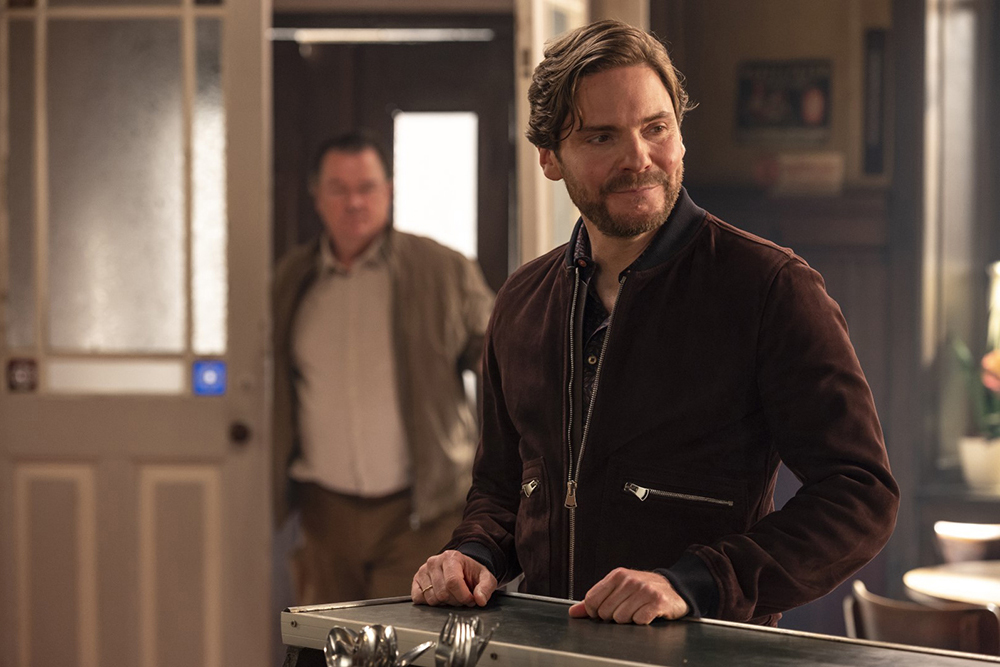
Q : What was the most difficult scene for you to shoot and play in this film ?
Daniel Brühl : the most difficult part to shoot in the film well there was different complications i mean we were hit by the pandemic for example so we couldn't shoot these scenes outside very easily that was kind of complicated because of the situation as it was. The only thing, i found tricky is to direct myself so i fully relied on the director of photography and the assistant director to have you know an honest and blunt judgment and opinion by them because that I’ve sometimes found difficult it wasn't difficult to direct Peter also in the double function as direct and actor that worked fine but you know judging yourself was tricky sometimes
Q : The editing of your first film is excellent and the plot keeps us on the edge of our seats from the first to the last minute, can you tell us about your collaboration with the screenwriter Daniel Kehlmann and the editor Marty Schenk ?
Daniel Brühl : one director i think it was Wolfgang Becker that Good bye Lenin told me very early on if you do a film you have to make sure to make a good casting of the actors but also of the crew and because then you are able to delegate and this was something crucial and for me doing my first film to rely on the expertise of so many you know talented people and it started with Daniel Kehlmann. i cannot write and I cannot write dialogue so i sometimes have an idea which is good but then I don't know how to deal with it. Originally i wanted to do this film in Spain 10 years ago and i had written down some notes and some things that you know. I could not use so when I transferred it to Berlin immediately thought of Daniel Kehlmann because I absolutely love his writing, the sense of humor the absurdity, the intelligence in the dialogues and in these very ambiguous ambivalent characters that he has invented. It's always impressed me a lot and also i know that he's a man who came from theater. He has written a couple of weak laws and he's Austrian they have this dark sense of humor which is very different to the German sense of human and that's exactly what I wanted and we had met each other we had known each other for quite some time and became friends and still i found it a bit you know over the top and preposterous too to ask him but then i thought i have nothing to lose he's a kind and very polite man he can say no and so i called him up and said listen i have an idea and he said well then then tell me and then after 15 minutes he engaged and said this is something that he enjoys something that he has experienced in a different way something that he could work with and that was wonderful because he invited me to be by his side so i was amazed about how quick he is how efficient he is in his head and how he could filter ideas that i had transformed them you know and so it became a very symbiotic partnership and we want to continue now we have two new ideas that we want to work on and thank god because without him this film would obviously not be there.
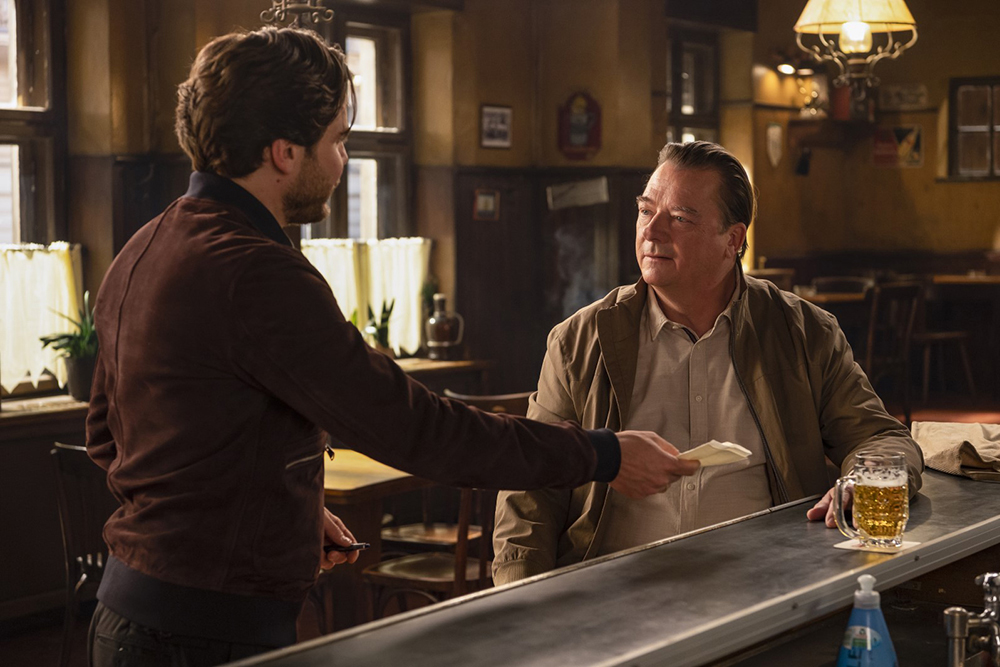
Q : What can you tell us about your filming locations in Berlin ?
Daniel Brühl : i wanted to spend most of the time in certain neighborhoods. We couldn't do it all in one. It is supposed to be the prince loud back in the East where i still live and have been living for 22 years but we also jump to the neighborhood which is very close near the center but then also we had to go for logistical reasons and to jump to Coinsberg and so the bar from the outside is real from the inside it needed to be built then i got the set designer, another you know expert and the best in her field is Susanne Hopf who did the set design for many films by for example Andreas Dresen and she is from the east and so i knew that every single detail in the east Berlin bar she would know about you know so we constructed it and that was very helpful shooting wise you know to be in a safe in a studio.
Q : your movie is very musical, . Can you talk a little about your collaboration with the composers Moritz Friedrich, Jakob Grunert ?
Daniel Brühl : i have known Jakob for quite some time he's the brother of my partner the producer Malte Grunert very connected in the music scene and he had presented me an artist named Siriusmo who is an electronic music artist in in Berlin very well-known and with a huge knowledge about music and not only about electronic music but also about eastern German music so he put me in touch then with other artists and i got hold through him. i could, I got hold of a song that sounds exactly like a ballad from you know the 70s the GDR you know and it was the first song that he had played to me just to check if that's what i was looking for and i said this is it, they used it for as a children's song with different lyrics so we needed to change the lyrics and needed Peter Cool to sing it but also with the whistling it has a sort of a Ennio Morricone western kind of touch on top of that GDR sound you know and that's exactly what I was looking for. And other than that music i realized that with Marty Schenk the editor whenever we tried music score like the typical score that you would win it always destroyed the moment and it made it weaker so the energy of the dialogues were not as creepy anymore it always had the counter affects you know whenever you tried to push the emotion it became less so we said the only thing we want to hear is like almost like an interior feverish sound and music in Daniel's head so to say and we realized that percussion is a good way to achieve that but very subtle so not that much was needed and so the song at the end really stands out.
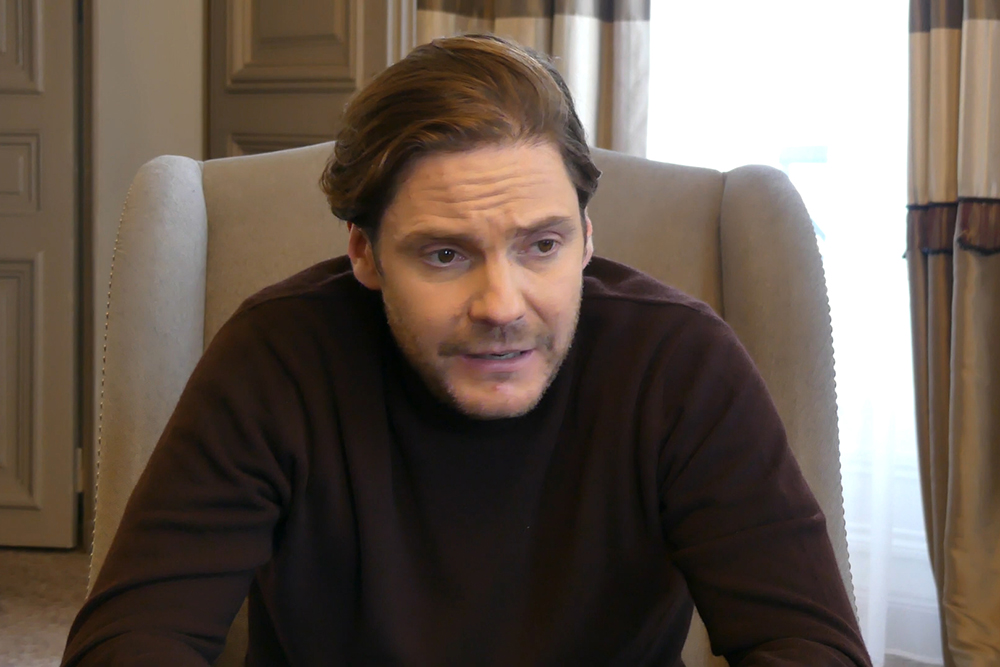
Q : What autobiographical part did you incorporate into your first film, which is about superhero movies ?
Daniel Brühl : it was fun to play with my persona, you know to add you know some humiliations personal professional you know experiences that have been either nice or painful the criticism that you get all that was great ammunition for the neighbor, for Bruno, so at the very beginning i was thinking about another profession i just wanted someone in this case from the West someone who is benefiting from everything that this modern life provides you know the guy who travels and is more or less successful in what he does and has that fancy apartment and a family and is very self-centered and i was thinking of a politician or a lawyer or something like that and then i thought no it's my first film I don't know about these worlds why not an actor and then the next step was i was why not me because then i can fill it with all the things that i have experienced and yet i play a man who is very different to me so that that combination was fun.
Q : What do you think people can learn throughout your film ?
Daniel Brühl : i don't know but it's what i like about us certain kind of comedies is when comedy actually deals with you know important and serious subject matters but it doesn't lose the tone of you know of comedy and that's what i wanted to achieve so it's a dark comedy but it deals with the changes in the cities with gentrification with the social imbalance with you know, with the conflict that we still have in Germany between east and west. It is about failure in life deception, it is about looking outside and looking inside. It's about you know how much do we know about our neighbors how much do we know about our environment and also how much do we know about ourselves.
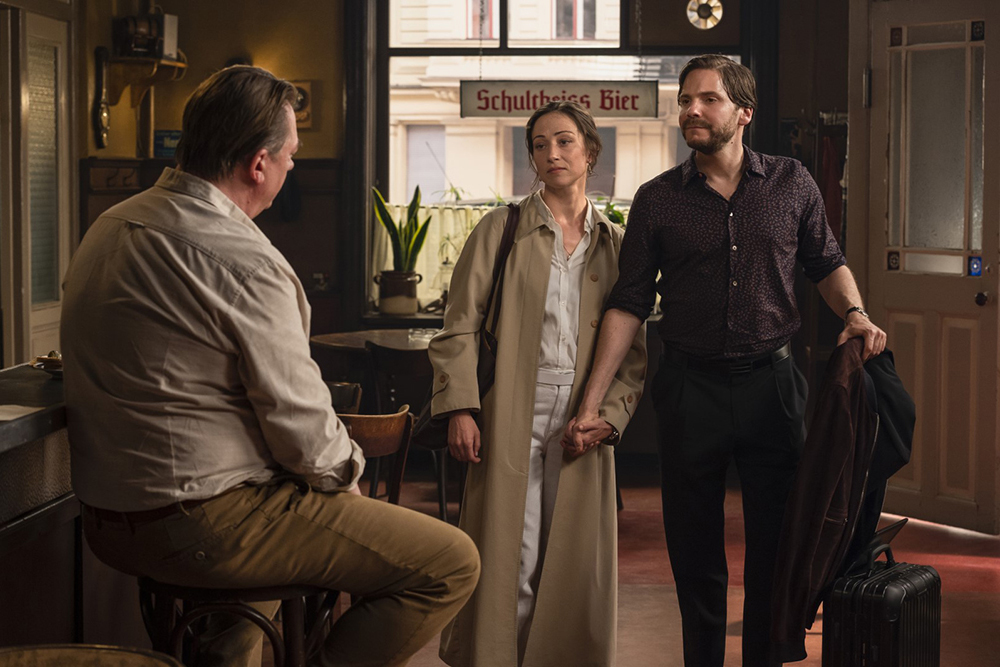
Q : After playing films in the United States and in Europe, do you see important differences in the way to create a film ?
Daniel Brühl : it can be. It depends on the size of the project. There's certain things that i could not do in Europe or they wouldn't be done that way in Europe if I think of something like Marvel for example this is a this is a scale that is huge but i always enjoy these experiences the more diverse the better so i saw that there's a highly professional level at Marvel for example if you think of the actors but also of everyone involved so i was always very inspired and it allows you to do something completely different also as an actor to be you know experimenting with you know stuff that you normally cannot do so i really enjoyed that and then ultimately it is always the story has to be attractive you have to see something in it that triggers you it the character that you play obviously too. It's about it's in the script and then it actually doesn't matter that much how big or how small something is but you know something like Marvel can only be done on that big level and it's sometimes also films that you know sometimes in Europe or in Germany you read a scrip, let's say a period film and it's like it says 50 carriages, 500 horses a couple of hundred, you know extras and a castle and you know and if it's if the story needs that then it is very disappointing if you arrive on set and there's a cottage and two horses a donkey no carriage and 20 extras no and then you're supposed to create this this grand you know idea that you read in the script and if it's not there then this is a problem so sometimes you really enjoy if you see the, you know if you see the splendor and you know, you shoot what you what you read.
Q : Do you have an anecdote to tell us about the shooting of this film ?
Daniel Brühl : it was Peter Kurth ended up saying it took him because i always i could feel that after saying action he always freezed a little bit and at first he didn't want to say anything but in fact i thought it would be funny to not say action but i said it in german, in my cologne dialect and so he's really from the east and that was really like almost a Bruno and Daniel moment it was with him and me because after a couple of weeks he told me i cannot stand this Cologne happiness This tone is horrible could you just say “Aktios” so it was not something Peter liked council.
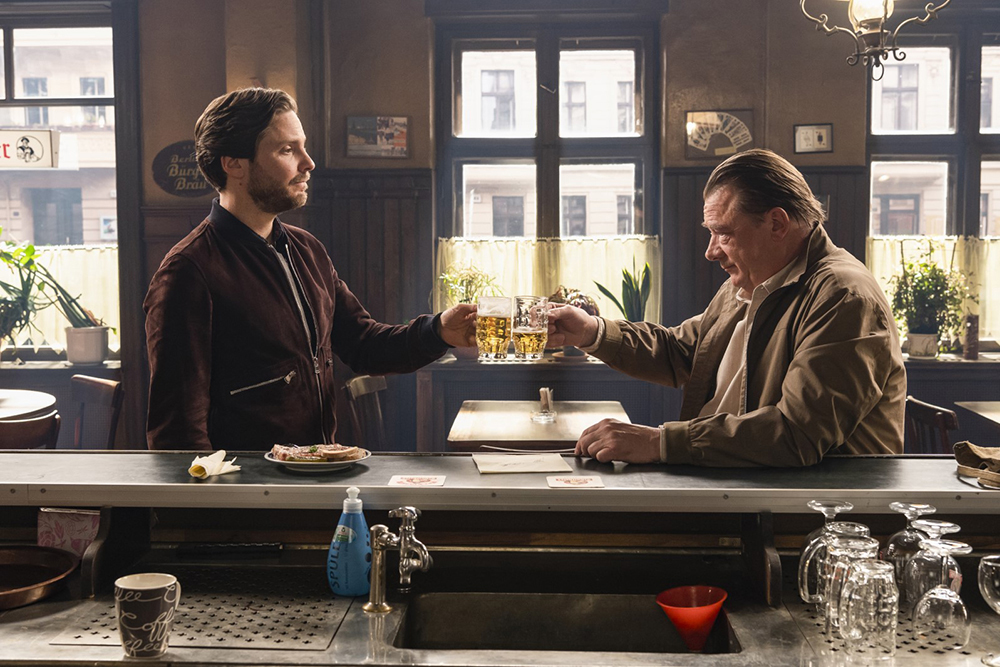
Q : Can you talk a little about how important is this film about the film industry ?
Daniel Brühl : yeah this obviously criticism and a lot of irony when i deal with the Daniel in the film you know he's a special kind of actor who is you know very exposed and it makes me think of all the actors who are willing to expose themselves in an extreme way and we see that with social media what has been you know happening and it's very worrying for me because actors by that for example lose their mystery you know it happens to me that i sometimes watch a film and i'm distracted because i think oh this guy got divorced and she had her second baby and you know so actors then by that attitude lose their mystery you know and on the other hand it's interesting because people have that hunger for gossip and want to know about every intimate details so on both sides this i think is kind of creepy these days.
Q : What did you learn and retain from playing and directing you first film ?
Daniel Brühl : oh i learned a lot along the way I learned about writing the structure timing pace you know how can you keep up the energy if you are in a “Huis-clos”. It's difficult to manage that you know that the whole story the structure the dialogues always push you further and further and you can keep up the right tension and energy and how do you do it so that these characters become human you know that they don't remain a cliche you know what so that there's a journey of both becoming humans you know and so that was fascinating also giving it the rhythm it's like if you have a concerto and you in the editing you decide then where's the crescendo where where's the pause uh where do we need to speed it up you know this was incredibly fascinating as an experience and then also the subtleties in the mixing you know at the very end when the film is actually there but then you add like sounds and how much a scene changes if you hear a truck or a church bell or you know all these elements which make the film then even richer you know and sometimes, you can even change a complete scene by one tiny little subtle detail this was all an incredibly fulfilling process for me to learn that.
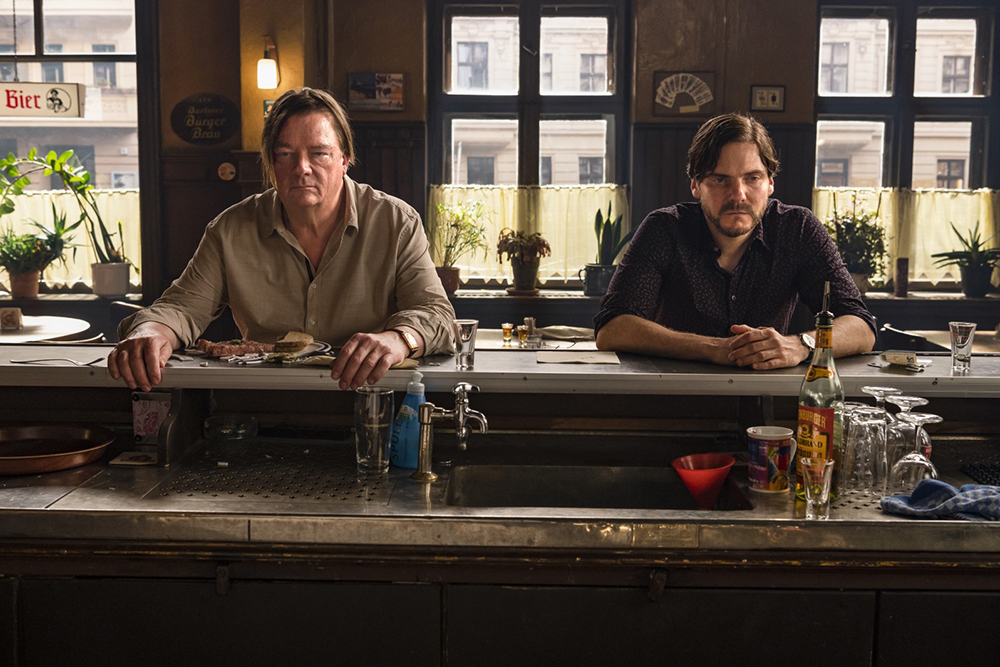
Q : Can you talk a little about your next movie The King's Man and which are your currents other projects ?
Daniel Brühl : yes, i gonna watch it pretty soon i still haven't seen the entire film and we're gonna promoted it and it's gonna come out soon in England it was again one of these experiences for me that were you know like being in a lunar park like it's a gigantic project. I am very proud of what Matthew Vaughn has created I mean to create a franchise is quite something and it's the level of perfection and detail is mind-blowing because the man has all in in his head and every single shot was very demanding visually choreography wise in every single detail you can imagine so i play a peculiar parts in its pulling the strings in world war one it's reinventing the history in a way it reminded me it's a very different kind of film but it reminded me of inglorious bastards where Tarantino then reinvented history and the second world war Matthew born goes back to the first one and i hope you will enjoy it and see what he has done with it and i'm afraid i cannot tell you that much more.
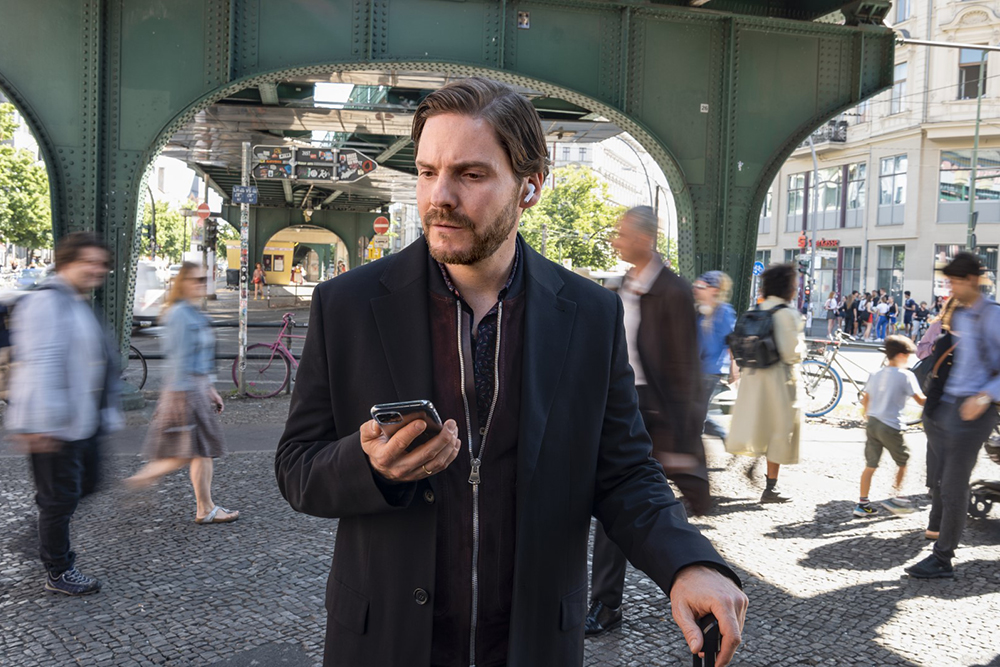
Synopsis :
In Berlin, Daniel is a famous actor who lives in a beautiful apartment with his charming girlfriend, their two children and the nanny. He is about to leave for London where the casting of a superhero movie awaits him. While waiting for his driver, Daniel goes to the local bar without knowing that he is being followed by his mysterious neighbor, Bruno. This premeditated meeting will take Daniel to the dark corners of his intimacy. Bruno is determined to make his life hell.
Next Door
Directed by Daniel Brühl
Written by Daniel Kehlmann
Produced by Daniel Brühl, Malte Grunert
Starring Daniel Brühl, Peter Kurth
Cinematography: Jens Harant
Edited by Marty Schenk
Music by Moritz Friedrich, Jakob Grunert
Production companies : Amusement Park Films, Erfttal Film, Gretchenfilm, Warner Bros. Film Productions Germany
Distributed by Warner Bros. Pictures (Germany), Eurozoom (France)
Release date : March 1, 2021 (Berlinale), January 2, 2021 (France)
Running time : 92 minutes
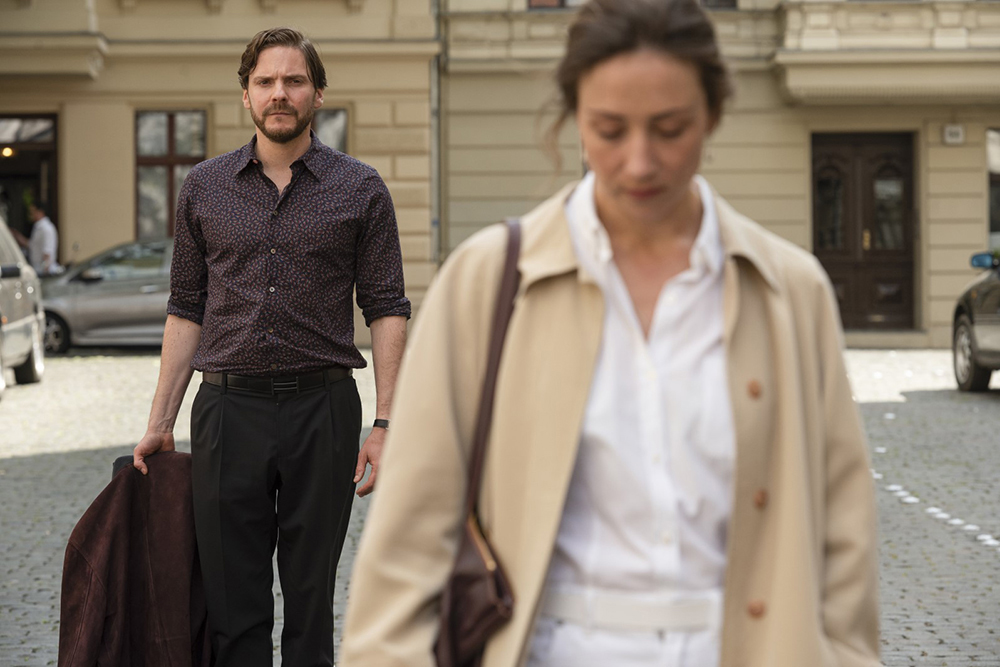
Photos : Copyright 2021 Amusement Park Film GmbH / Warner Bros. Ent. GmbH

